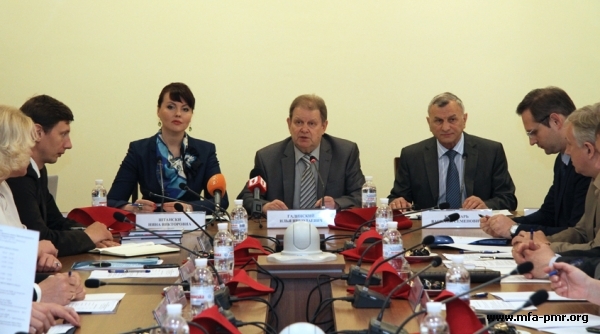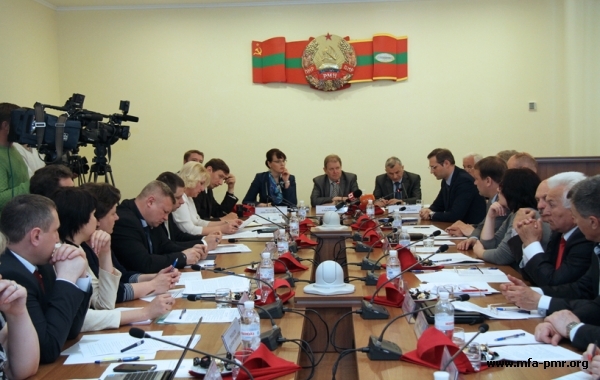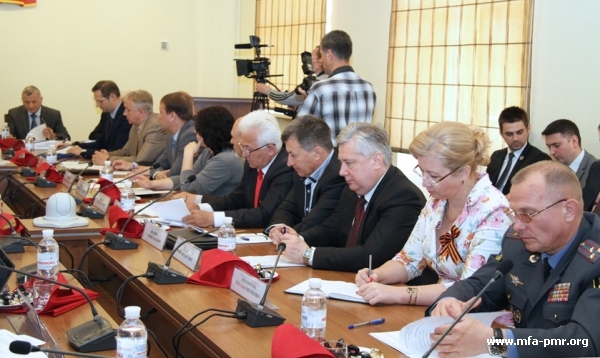The Head of the Foreign Ministry gave a speech on “Negotiation process between Pridnestrovie and Moldova: view through the prism of the documents dated from more than 20 years ago”. As highlighted by the Diplomat in her speech, the settlement of the conflict began before 1994 and the 1992 Agreement became its starting point which was of key importance for a variety of reasons for today's negotiation process. “The Agreement established a key role of the Russian Federation in the negotiation process, the Security Zone was built. Russia was given a central role in the framework of the peacekeeping operations which is especially important in the context of the continual calls for transformation of the existing mission. The most important principles of the negotiation process such as inadmissibility to apply sanctions and blockades, removing any obstacles that hinder free movement of goods, services, and persons were laid down,” – she stressed.
While referring to the Statement of the 28th April, 1994 by the leaders of Moldova and Pridnestrovie which marked the start of the negotiation process, the Head of Pridnestrovian diplomacy noted that a wide range of provisions of the document are of fundamental importance under present conditions. “Pridnestrovie appeared as a signatory of that essential document thus it marked the start of the international legal personality of the PMR within the framework of the negotiation process. The agreements were recorded on overcoming disagreements in accordance with people's will and for their interests. This is particularly important because the course of Pridnestrovie's foreign policy is based on the referendum, in addition referenda on any key issue have never been held in Moldova. Furthermore, this is the first and only one document signed by Moldova where the regret was expressed concerning the mistakes made in the process of development of new independent states which sparked off the armed conflict, loss of lives, and caused extensive material damage. There were no more such confessions in the history of the talks,” – stated the Minister.
Nina Shtanski also highlighted that in 1994 the Statement defined the priorities of the negotiation process, however, it has taken the parties 20 years in order to agree subsequently within the framework of the definition of the negotiation space that they designated. “According to the document the parties agreed to remove any impediments and to forge relationships in trade, financial and other spheres, that is the priority that the Pridnestrovian side proposed the 5+2 participants to implement in the framework of the “small steps” tactics,” – she said.
In her speech Nina Shtanski noted the achievements of the negotiation process over the last years: resumption of a full-scale freight railway communication, disposal of radiation elements from the territory of Pridnestrovie, a number of decisions on infrastructure projects, dismantling of the hazardous cableway in Rybnitsa, construction of treatment facilities in Dubossary District, decisions on freedom of movement of Russia and Ukraine's citizens through the territory of Moldova, the excluding the withdrawal of Pridnestrovian diplomas during the procedure of the nostrification, a number of decisions on health care, ecology, and pension coverage. According to Nina Shtanski, a major achievement was the fact that in the framework of the 20th negotiation process the parties were able to sign an Agreement on Principles and Procedures of Carrying out Negotiations, to record the principle of equality of the parties, status of the participants and “not to carry out negotiations about negotiations any more”.
The Head of the Foreign Ministry of Pridnestrovie considers that the major factors reducing the effectiveness of the negotiations are the Moldovan side's effort to “reset” the negotiation process, failure to fulfil previously reached agreements, the absence of system of guarantees, as well as systematic pressures, restrictions and blackmail. The key to success in negotiations is confidence and constructive spirit. “The confrontation should be excluded, reaching the agreements should definitely lead to their implementation, and it, in turn, should be noticed by people and should form confidence. Confidence is the main thing that we failed to reach over 20 years,” – said the Minister.
The Deputy Director of the ANO “Dniester-Prut Centre of the RISS” Vasiliy Kashirin spoke about the role of the OSCE Istanbul Summit of 1999 in the history of the foreign policy of Russia and settlement on the Dniester. The Russian expert dwelled on the historical context and conditions of the foreign policy which accompanied the Summit.
The Deputy Foreign Minister Vitaly Ignatiev in his report on Topical problems of the activity of the expert (working) groups of Pridnestrovie and Moldova highlighted the issues of the agenda of the working groups, factors complicated the bilateral cooperation. Among those factors the Diplomat denoted pressure by the Moldovan side, refusal to implement previously reached agreements, as well as attempts to fill the agenda of the negotiations with issues which were not agreed.
The Rector of the Pridnestrovian State University Stepan Beril in his report dwelled on the negotiation process between Pridnestrovie and Moldova in the sphere of education, and noted in that context the difference of established education systems. In the words of Stepan Beril, the Pridnestrovian education system is developing in full compliance with the Russian standards, the Moldovan education system tends inherently to the Romanian one. Such circumstance seriously limits the capacity of discussions on the probability to build a common education space.
The director of the Social and Political Research Centre “Perspektiva” Ilya Galinsky determined “the imperative of recognition” as a strategic line of Pridnestrovie in the negotiation process. This imperative is caused by both striving for independence expressed by the Pridnestrovian people in the referendums, and the polarity of the geopolitical vectors of development of Pridnestrovie and Moldova. Ilya Galinsky also explained his vision for the dependence of Russia's position on forthcoming election in Moldova, he also highlighted impossibility to implement the plan of federalization of Moldova and Pridnestrovie owing to lost time and therefore opportunities.
Director of the Independent Center for Analytical Research “New Age” Elena Bobkova, provided the sociological dimension of the negotiation process of Pridnestrovie and the Republic of Moldova. In her speech she drew attention that striving of Pridnestrovie's people for independence and close cooperation with Russia are sustainable trends, but the research results, in turn, show that in difficult conditions the cohesion of Pridnestrovian society increases. Elena Bobkova named 2006 as an example when under conditions of economic blockade 75 % of Pridnestrovian people confirmed that in the current situation it was Russia that could help. At the same time she noted that among the factors affecting the settlement of Moldo-Pridnestrovian relationships the negotiation process takes fifth place and in this regard, maintains the enough stable rating for many years, according to sociological surveys.
The lecturer of the Department of Political Science and Political Governance of the Institute of History and Public Administration, ex-Foreign Minister of the PMR Vladimir Yastrebchak in his report listed the topical political and diplomatic challenges faced by the foreign policy of Pridnestrovie. According to the expert, among them desovereignization of Moldova which will come after the signing of the Association Agreement with the European Union occupies a special place.











